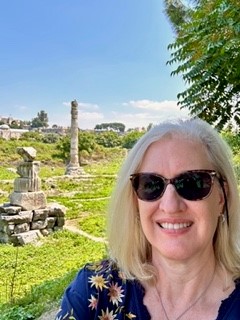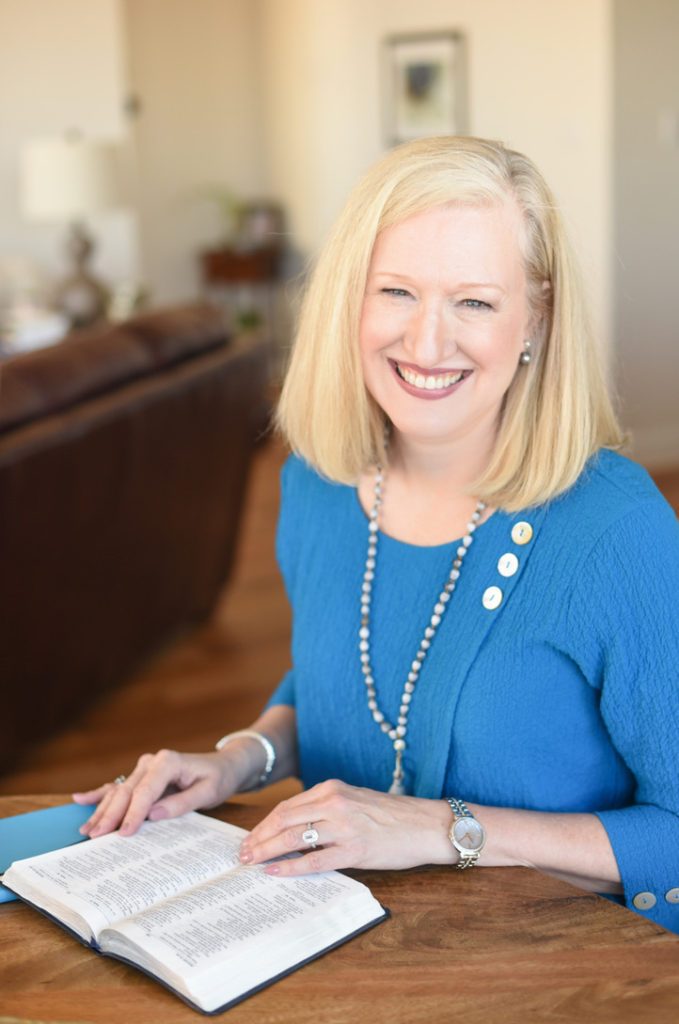Meet Dr. Cynthia Hester.
Dr. Cynthia Hester stands close to a fellow sojourner in the ancient main street of Ephesus. Heads close, voices hushed in reverence, the two exchange words over the statues they observe. Her profile aligns with those of the Greek statues she stands explaining. Tall. Regal. Elegant. Not surprising at all that she would take the opportunity to help a fellow observer better understand what they behold. Once you know her desire for people to develop a deep theology, it makes perfect sense that she would spend her time amid the ancient ruins teaching passersby.
When asked about her upbringing, Doctor Hester laughs as she says, “I’ve experienced a wide range of beliefs.” That range spans from Christian Missionary Alliance to Southern Baptist to Nondenominational congregations. Through all the different church experiences she maintained a deep love for God and a desire to follow Scripture. The Baylor graduate eventually started wondering about what she saw men and women doing in the church. She decided she had to find out for herself. She earned her Doctor of Ministry Leadership (DMin, 2022) and Master of Arts in Christian Education (MACE, 2017, summa cum laude) at Dallas Theological Seminary.
While sitting under the tutelage of Dr. Sandra Glahn in her “Foundations for Women in Ministry Leadership” class, Doctor Hester began to understand she had internalized a belief that women filled the role of accessory to men—important but not the main players in the kingdom.
These feelings took root from the messages she received growing up and what she experienced as an adult in church and ministry. In the safety of Doctor Glahn’s class, she set aside her borrowed theology of women and parsed through history, biblical study, and differing views of women in the church to discover gender does not inform God’s love for his children.
Having discovered previously unknown historical stories of women such as Phoebe, Priscilla, and Junia, working shoulder to shoulder with their church brothers and reading stories of women from the Bible free of previously tilted prejudice, she found a deep well to draw from when constructing her own robust theology of women. She found role models and heroes of faith in her research. She found women who were strong partners in kingdom building. She found brothers and sisters working side by side as God’s ideal for his children, neither one occupying an accessory role.
A Safe Place to Learn?
Discovery quickly turned to concern for others in her position who had grown up in a wide variety of traditions and received the same hidden message of women functioning as simple accessories. And if she received this hidden message loud and clear, what deeper message did other women receive? Her fears deepened when a prominent church leader in her area admitted publicly that he had never bothered to develop his own theology of women, but he too had just borrowed his theology from his tradition.
Doctor Hester investigated outlets in Christianity for people to go on a similar journey to develop their own theology of women and met with a hornet’s nest of emotionally driven articles, responses, and vehemence. On one side, people passionate about what the Bible says about gender roles, on the other side people trying to honor #metoo, #churchtoo, and attempting to revisit a largely unvisited topic that effects 60 percent of the American church community and likely 90 percent of the church worldwide. Where could fellow believers go to study the work of women without entering some sort of Christian cage match? Sending the Christian community at large to seminary seemed like a miracle only possible when Jesus once more walks the earth.
God used the tension to propel her in her studies at Dallas Theological Seminary. Her first step? Take koine Greek of course! She tells of starting Greek, hoping that acceptance into the doctoral program would follow. She laughs and says, “Not sure what I would’ve done if rejected by the doctoral program!” But of course she had nothing to worry about. Her doctoral work centered around creating a safe space where people could drop their borrowed theology of women and adopt their own based on historical, biblical, and theological study. She wanted to create a program that would incorporate biblical study, historical research, and survey orthodox views of women in ministry so people could view the material in a place where education drove, opinion sitting in the back seat. In fact, her doctoral project received extensive editorial processes and the observers could not discern where Doctor Hester landed in her own beliefs. She successfully created a safe place to study.
Theology of Women Academy®
Doctor Hester’s dissertation had two aims. First, review the historical record of women’s public ministry across the ages to raise awareness of the value of enabling women’s voices and gifts in the church. Second, serve as a vehicle to stimulate a greater flourishing and missional effectiveness of women in local churches and para-church ministries. She hoped other women would receive encouragement from female role models in church history. As God does, he knit together Doctor Hester’s love of educating people and her desire for people to have a safe, education-driven place to develop their theology of women, and Theology of Women Academy® launched.
The Academy offers a comprehensive online course for understanding a spectrum of orthodox biblical beliefs and developing a view of women and the church. As the only program of its kind, the Academy’s goal aims to move the learner from uncertainty and confusion to
clarity, an informed foundation, and the development of their views on women and church leadership. Through six self-paced modules, twenty lessons, and live group Q & A Zoom calls, the online course allows students to develop their own robust theology of women. The Academy has reached students from Ukraine, France, and Ethiopia.
At the conclusion of the Academy’s modules, students understand key words and related terminology such as complementarian, egalitarian, mutualist, descriptive, prescriptive, feminist, authentein, ezer, and many more. Attendees consume significant literature and sift the spectrum of orthodox views and their related arguments on women and church leadership. They grow in their understanding of significant Bible passages including historical and cultural backgrounds related to women and the church. Students obtain an understanding of how women’s historical leadership functions in the Bible, the early church, and in church history. They also examine Jesus and the Apostle Paul’s interactions with women in the New Testament and obtain an understanding of select Bible translation issues in relevant texts on women.
Final Challenge from Doctor Hester
Doctor Hester leaves us with these five ways to value women and their gifts of teaching and leadership.
1) Teach women to aim for Christlikeness rather than gender-based roles.
2) Trust and treat women as sisters, co-laborers, and necessary allies in pursuing God’s mission for the world.
3) Preach and teach the inspired words and stories of women in the Bible.
4) Preach, teach, and read from Bible translations that aim to make women visible in the text.
5) Engage in a study of Scripture and church history for the purpose of developing your own theology of women.
Just as she paused on the ancient main street of Ephesus to help a student better understand a statue, Doctor Hester desires believers to stay away from borrowing their theology of women and dive into the deep well of information provided through Theology of Women Academy® to develop a personal theology of women that matches the robust history available to us all.
For more information about the course visit: https://cynthiahester.com/course/.
Sources:
https://cynthiahester.com/
https://blogs.bible.org/the-bible-women-are-more-present-than-we-might-think
A Handy-Dandy Breakdown of Different Christian Denominations – Theology Pathfinder (derekdemars.com)


